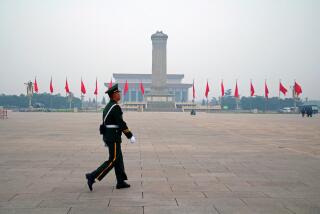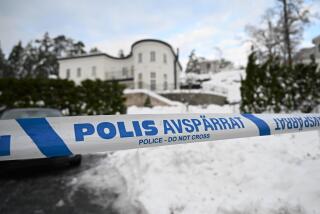West Steps Up Spying, KGB Official Says
- Share via
MOSCOW — Despite the end of the Cold War, the West is increasing its espionage in the Soviet Union, the new deputy chief of the KGB, the country’s intelligence and security agency, said Tuesday.
Viktor S. Grushko, a veteran spy, who has recently directed Soviet counterintelligence efforts, said that 35 “most dangerous agents,” largely recruited by the U.S. Central Intelligence Agency, had been caught in the last five years.
“In spite of the very positive changes that have taken place in international relations, Western (intelligence) agencies have not reduced their activities in regard to the Soviet Union,” Grushko told a press conference. “In fact, they have been intensified. . . .
“It is clear to us that the West, particularly the Central Intelligence Agency, is paying special attention to technological developments in our military industry that are not yet discussed openly in the press. We sense that very strongly, and we are taking the appropriate measures.”
He said that with the Soviet Union’s increased openness under President Mikhail S. Gorbachev’s reforms, Western intelligence agencies had shifted their efforts from gathering political information to classified data from the country’s defense industry.
“There is no denying that we have suffered serious losses as a result,” he said, “but we are also having some success in exposing these Western agents.”
While he did not elaborate on the fate of all 35 “most dangerous agents,” prison sentences and an execution have previously been announced in connection with espionage cases.
Grushko, appointed last week as the first deputy chairman of the Committee on State Security, as the KGB is formally known, held his meet-the-press appearance before Soviet and foreign journalists at a time when the agency is seeking to find a place for itself amid the country’s political reforms.
Grushko smoothly acknowledged that the KGB still spied and tried to catch the spies of other countries, that it still concerned itself with political crimes--now construed as attempts to overthrow the government and terrorism rather than mere dissent--and that it was working even harder to check the growth of organized crime and international drug trafficking.
But he maintained that the KGB is now working within the country’s legal system, subject to control by the government, Parliament and courts and increasingly scrutinized by the public and the press.
Grushko, 61, white-haired and well dressed, is part of a new lineup at the top in the KGB under Vladimir Kryuchkov, who was named as chairman in 1988.
Grushko, deputy head of intelligence under Kryuchkov before serving as director of counterespionage, succeeded Filipp Bobkov, 66, who moved to the Defense Ministry as a consultant.
A 45-year veteran of the KGB, Bobkov spent much of his career prosecuting political dissidents. Grushko, by contrast, has been an intelligence officer since joining the KGB in 1960 after five years as a diplomat. With more than a little pride, he said he had served 14 years abroad, apparently overseeing Soviet espionage in West Germany.
“Time goes by, and we need changes,” Grushko said when correspondents pressed for an explanation of a number of leadership changes at KGB headquarters. “Competent new people are being appointed from upcoming generations to handle the tasks of the KGB.”
More to Read
Sign up for Essential California
The most important California stories and recommendations in your inbox every morning.
You may occasionally receive promotional content from the Los Angeles Times.










